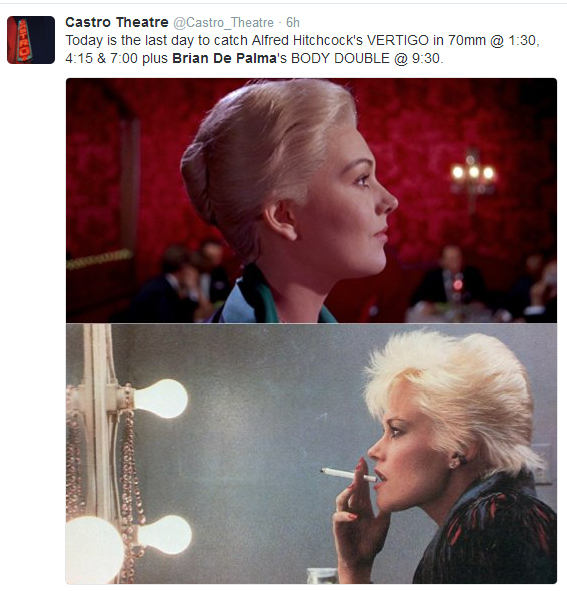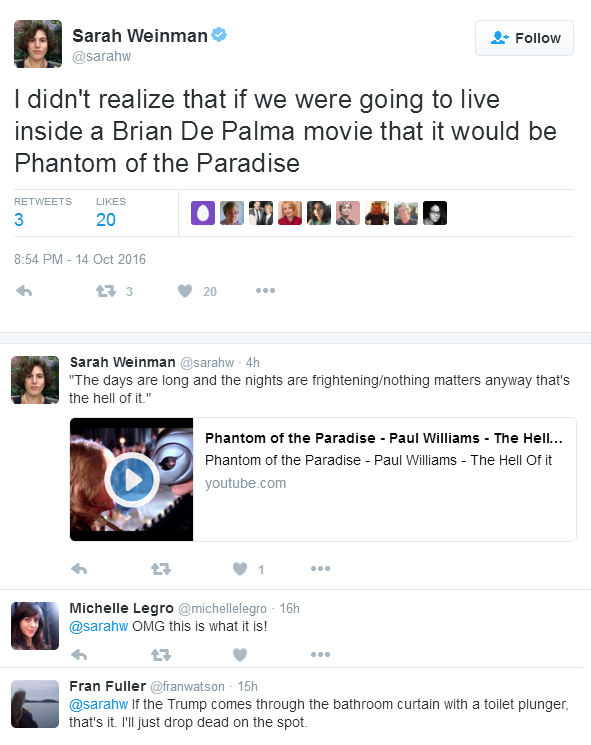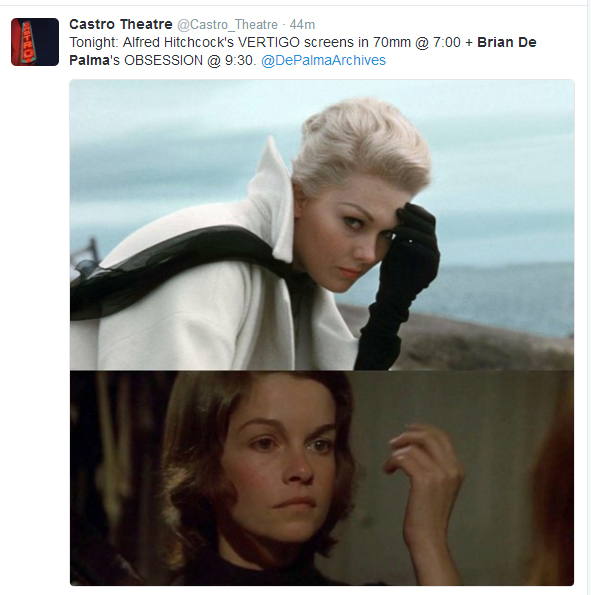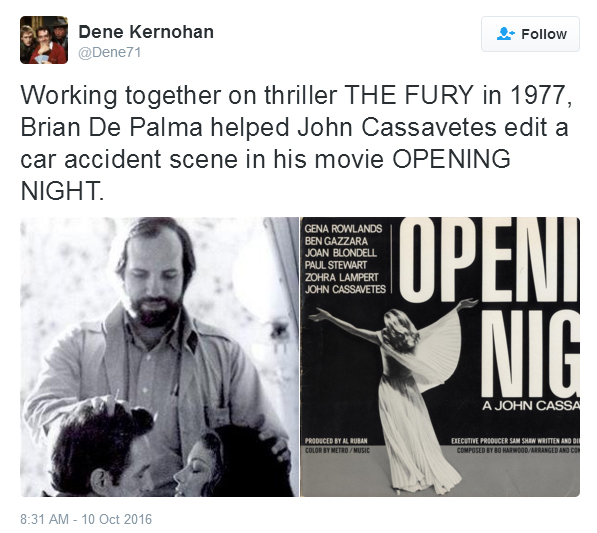NY TIMES - DE PALMA, KING, COHEN TALK 'CARRIE'
PLUS MORE LINKS TO REVIEWS UPON ITS 40TH ANNIVERSARY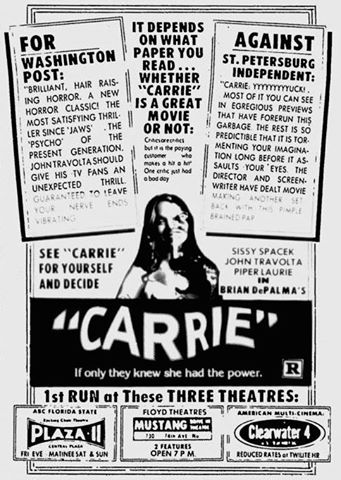 The New York Times
The New York Times ran a Sunday feature yesterday written by
Gilbert Cruz, with the headline, "‘Carrie’ Is Back. Like a Bloody Hand From the Grave." The article includes quotes from
Brian De Palma,
Stephen King, and
Lawrence D. Cohen.
"I never really approached it as a horror movie," De Palma tells Cruz. "It’s more of a character piece. She does go berserk after she gets hit with the bucket of blood, but until then, not really. What made this really good — both the book and the film — is that it capsulized everyone’s high school experience of being an outsider."
Later, De Palma is quoted about Sissy Spacek: "The studio didn’t even want me to test Sissy. It’s probably the part she’ll be best remembered for even though she won an Oscar for another role."
Here are a couple of other passages from Cruz' article:
“It’s really a simple story,” Mr. King said. “And people saw Carrie as an extreme case of what they went through in high school.” Fresh out of college when he started the book, teaching high school English by day, Mr. King said he understood “it from both sides of the desk. There was a visceral sense that I was writing about something that I understood and felt deeply at the time.” In the mid-1970s, few had heard of Mr. King, a teacher who had mainly published short stories in men’s magazines. Lawrence D. Cohen, then working for a movie producer in New York, had certainly never heard of him when he plucked “Carrie” from a slush pile. He eventually wrote the screenplay. “I understood why critics were perplexed as to what genre ‘Carrie’ belonged to,” Mr. Cohen said. “Was it a high school movie, a sci-fi novel, a horror piece, a psychological thriller?”
...
United Artists considered marketing it as a B-movie. “They wanted to change the title to ‘Pray for Carrie,’ which is a very exploitation-movie title,” Mr. Cohen said. “And they ended up taking out an ad that was a poster of Carrie covered in blood, which was a spoiler before that word was used, but a clear way of selling the movie. I remember looking at it going, ‘They’ve lost their minds; they’re giving away the whole movie.’” In retrospect, the poster is a superb example of Alfred Hitchcock’s explanation of the difference between suspense and surprise — knowing a bomb will explode and tensing for it, versus having it blow up with no warning. Bloody Carrie is the bomb the audience saw before the movie even started.
One reason “Carrie” is considered such an effective horror movie is its final two minutes, in which Ms. Irving’s good girl, Sue Snell, visits a grave and a hand shoots from the ground, sending audiences from the theater with one more scare. It was the last thing they remembered about the movie and the first thing they told friends.
“What the ending did was establish Stephen King as a brand name for horror,” said Mr. Cohen, who also wrote a “Carrie” stage musical and the screenplay for the 2013 movie remake. The success of the original film boosted sales for the novel, and Mr. King’s next novel after the movie, “The Shining,” became his first hardcover best seller, and he was off.
But Mr. King has never lost his view of high school as a place like the island in “Lord of the Flies.” Those locker-filled hallways are the true dark corridors, and you don’t need to add too much to make it scarier than it already is. “I tell people, ‘If you look back on high school as the high point of your life,’” you’re one messed-up American, Mr. King said, using rougher language. “Most of us look at high school as something we escaped.”
MORE LINKS - REVIEWS OF 'CARRIE' ON BLU-RAYPeter Sobczynski, RogerEbert.com
"Then there is De Palma, who conducts the proceedings with the kind of self-confidence in his artistic gifts that few filmmakers manage to achieve in their entire careers. Over the years, he has proven to be one of the most divisive of American filmmakers but this is perhaps the one film of his that everyone, regardless of where they stand on his career as a whole, seems to admire. Even though he obviously didn’t come up with the story himself, he has such a handle on what he wants to say with it and how to say it that Carrie feels just as personal as any of his self-generated projects. He effortlessly taps into our collective memories of the actual high school experience—oftentimes far removed from the version put forth in the kind of dumb movies that he definitively rebukes here—and uses them to both inform the story and help us embrace Carrie in a way that not even King was able to completely pull off in the book. At the same time, he again demonstrates his mastery of audience manipulation by first getting viewers completely on Carrie’s side and then eventually putting them in the discomfiting positions of A.) anticipating the sight of her prom night humiliation and B.) watching the person they have grown to like slaughtering all her classmates afterwards, even though many of them have themselves done nothing to deserve such retribution. (In fact, the grisliest death in the sequence is the one suffered by the gym teacher, who had done nothing except try to help Carrie out, even though her actions would play an inadvertent part in the horrors to come.) He is so much at the top of his game here that even if you have seen the film a number of times before, he still manages to suck you into the story to such a degree that you can still be caught off-guard by the proceedings. Then, just when you think that it is over, he comes up with one final shock (one not in the book) that not only supplies one of the great jump scares in film history but brilliantly subverts the hoary cliche that everything can go back to normal once the monster is defeated—here, even if you manage to survive everything, you still don’t get out of it completely unscarred."
Donald A. Guarisco, Schlockmania
"That said, an effective tale of supernatural revenge needs a master manipulator at its helm – and DePalma does a brilliant, thoroughly inspired job here. There’s a long time before the big horrors kick in so the film relies on his ability to stylize the melodrama in a way that makes it feel suspenseful and laden with atmosphere. He pulls this off, using sleek photography by Mario Tosi and a melodic, emotionally charged score from Pino Donaggio to comment on the big emotional stakes of Carrie emerging from her shell as she is plotted against. DePalma’s underrated skill for directing actors gets a great venue during this section of the film.
"Once it’s time for the prom, the director gets to dig deep into his bag of tricks and the resulting display of cinematic pyrotechnics is awe-inspiring: he gets to deploy slow motion, split-diopter shots, elaborate tracking shots and what might be the finest use of split screen in any movie. From there to the coda, he finds an ideal balance between the visceral and the stylistically graceful that few filmmakers are capable of achieving. Without giving too much away, he also summons up a shock coda for the ages.
"In short, Carrie ranks with The Dead Zone and Stand By Me as the best films to emerge from the ever-growing ranks of Stephen King adaptations. It’s also a must-see for anyone interested in DePalma’s career or great horror films from the ’70s. Commercial horror fare doesn’t get better or more artful than this."
Bruce Westbrook, Tripping the Light
"Yet Carrie was a tough sell to studios, only getting greenlit when a new female exec championed its female-focused story (and wasn’t put off by an early scene involving Carrie’s horrified first menstruation in the girl’s locker room at school, leading to abuse from her classmates).
"Cohen also notes the film’s 'illusion of fidelity' to its source. He notes the many new scenes which were written strictly for the screen — a different medium which needs different approaches — and says King was grateful for the changes."
Jeremy Carr, cutprintfilm
"Pop culture may have worn away some of Carrie’s concluding shock, but the realization of its stylized, tragic, and destructive final sequence remains effectively engaging. Once Carrie steps foot in that school, the viewer is overcome with a visceral frustration and anger, knowing what awaits this temporarily joyous young girl. Carrie is a teenager after all, so there is an appropriately glamorous depiction of the star-spangled dance, courtesy art direction by Jack Fisk (Spacek’s husband). The vivid set-piece, as with those idyllic moments mentioned earlier, has a blissful, romanticized sheen, one that will similarly get undercut by blossoming horror. Once soaked in pig’s blood, Carrie drifts through the carnage as a woman possessed, a rigid red figure moving against the fiery blaze, enacting a murderous rampage that, at this point, seems beyond her control. Choreographed like a musical number, De Palma’s virtuoso integration of elaborate camera movement, traumatic slow-motion, and piercing split-screen (a tools-of-the-trade mastery for which he is now finally lauded) results in a visually and emotionally powerful finale, culminating with the fantastically evocative death of Carrie’s mother."
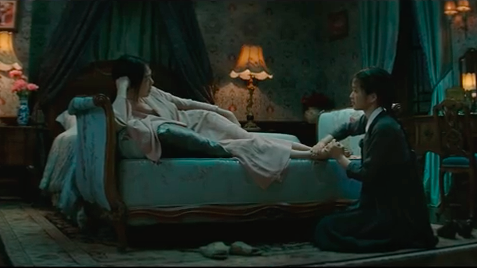





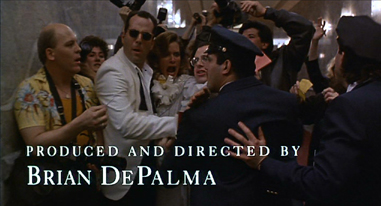 On Friday,
On Friday, 

